Scaling an ecommerce business is a coveted but intricate endeavor. As you expand, maintaining accurate and consistent product information becomes increasingly challenging. Over time, various data aspects—such as item numbers, SKUs, images, translations, and more—scatter across disparate platforms, leading to inefficiencies and inaccuracies.
To convey your product’s value effectively, maintaining precise, consistent information is vital. This includes detailed descriptions and high-quality images across all channels. As your business grows, relying solely on traditional tools like Excel becomes inadequate to manage the influx of data.
What is a PIM?

Product Information Management (PIM) systems excel at gathering diverse types of product data, often more comprehensive than anticipated. These solutions offer remarkable flexibility in managing an ecommerce store’s singular source of truth.
Here’s a breakdown of the kinds of data typically managed within a PIM:
- Media Files: In today’s digital landscape, digital assets significantly influence ecommerce success. A PIM simplifies the organization of these assets, housing product images, GIFs, videos, 3D renderings, or any media enhancing product descriptions. Notably, the choice of media displayed across sales or marketing channels varies, ensuring tailored content for each channel.
- Product Usage Details: Comprehensive product descriptions include guidance on using the product effectively. Some descriptions even suggest additional use cases, enhancing the product’s value for shoppers. For instance, product descriptions for blenders might encourage customers to explore uses beyond typical smoothies or milkshakes. An example is LARQ, effectively showcasing their bottles’ compatibility with both warm and cold liquids on their product pages.
- Emotional Connections: Employing product stories and emotionally resonant language enhances the customer experience. Brands like Solo Stove adeptly integrate narrative elements into their product descriptions, evoking powerful imagery of adventure and warmth. By immersing shoppers in compelling narratives, brands create emotional connections that resonate with their audience’s desires and aspirations.
Benefits of PIM:
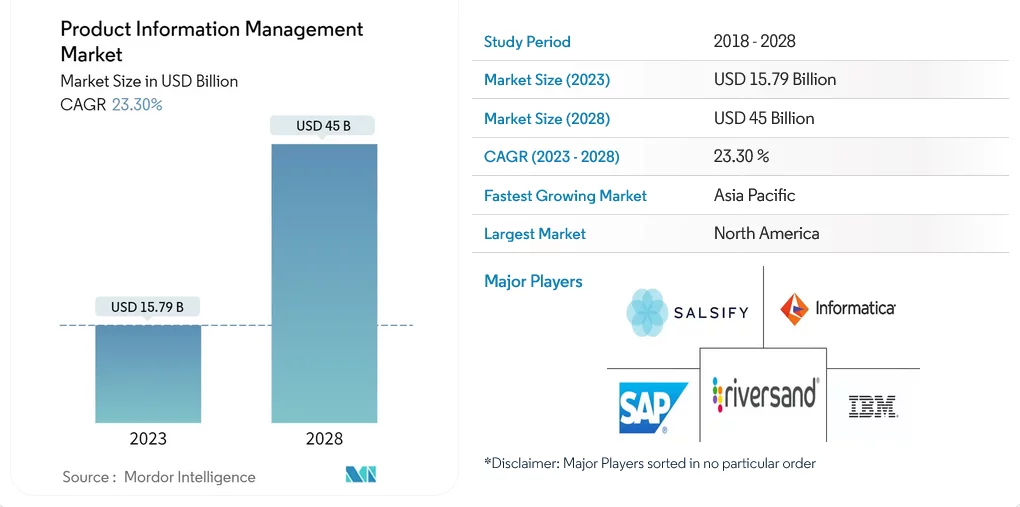
Source: Mordor
- Product Evolution and Roadmap: Understanding the product’s evolution offers insights into its growth trajectory. Inquiring about past updates, improvements, and future plans provides a glimpse into the vendor’s commitment to innovation. Details about upcoming features and functionalities in the product roadmap shed light on their vision and how it aligns with your business needs and goals.
- Onboarding and Implementation Process: Examining the ease of onboarding and implementation determines how quickly your team can adapt to the new system. Knowing the average time required for setup and deployment helps in planning. Additionally, understanding the time to market, i.e., the duration between implementation and actual product availability to customers, is crucial for business planning and strategy.
- Integration with Partner Network: Exploring how the product integrates with partner networks is vital for seamless operations. Understanding if integrations and optimizations are pre-built or require additional development support aids in assessing the complexity and cost of implementation. Knowing if the platform is open-source influences customization and scalability.
- Real-Time Data Sync: Real-time data synchronization is essential for ensuring that information across various channels remains current and accurate. Inquiring about real-time data sync capabilities helps gauge the system’s responsiveness and its impact on your operations and decision-making processes.
- Limitations and Scalability: Understanding any limitations imposed by the vendor regarding sales channels, languages, currencies, or storefronts is crucial. This information determines potential constraints in expanding your business operations or catering to diverse customer segments. Assessing scalability options is vital for accommodating future growth and expansions.
- Product Information Sourcing and Compatibility: Evaluating how the vendor sources product information and its compatibility with your existing product providers aids in assessing data consistency and management. Compatibility ensures seamless integration and minimizes data conflicts or discrepancies.
- Cost Implications of Multiple Feeds: Determining if accessing multiple manufacturers’ feeds incurs additional costs is crucial for budget planning. Knowing if there are extra charges associated with tapping into various feeds helps in estimating expenses and avoiding unforeseen financial implications.
Top Product Information Management Systems (PIM):
1. Plytix: Streamlined Product Information Management for Small and Medium Businesses
- Pricing: Starts at $450/month
- Visit Website: [Link]
- 250 reviews
- Freemium plan available + free trial
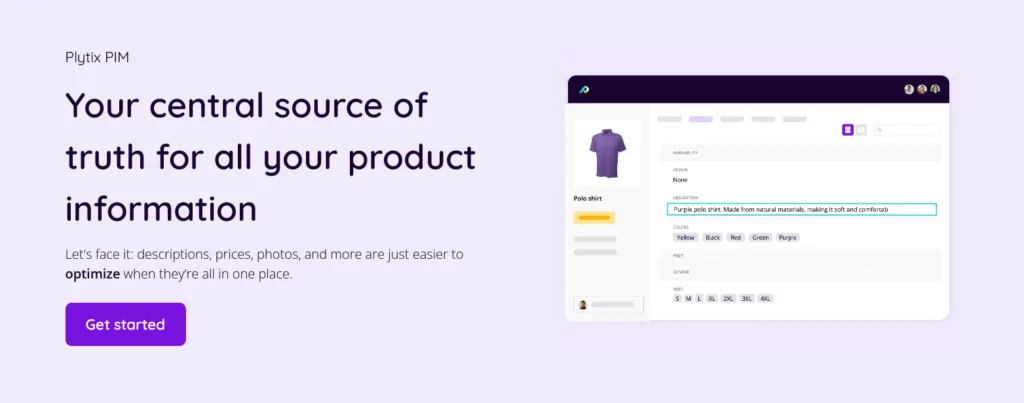
Plytix stands out as an excellent cloud-based Product Information Management (PIM) system tailored for businesses involved in omnichannel marketing strategies. It’s a platform where users can easily optimize and organize their product data through bulk editing, eliminating the reliance on outdated spreadsheets.
Why Choose Plytix: Plytix offers a comprehensive suite that combines both Product Information Management (PIM) and Digital Asset Management (DAM) functionalities. This system allows businesses to establish a centralized hub for product information and digital assets, enabling users to enrich their product data with various media files, including videos, images, pricing details, specifications, and additional descriptions. Its multiple pricing tiers make it an ideal choice for small and medium-sized enterprises.
Standout Features & Integrations:
- Computed Attributes: Enables editing of product information through formulas, efficiently managing more data with fewer inputs. A significant time-saver for smaller teams handling bulk information updates across diverse listings simultaneously.
- Product Completion Tracking: Manages new products throughout various content creation channels, flagging incomplete or lagging items during the development process.
- Integrations: Native integration with Shopify, with the flexibility for additional integrations through the platform’s open API configuration. This integration capability ensures seamless connectivity with various e-commerce channels, social media platforms, and online marketplaces.
2. PIMworks: Streamlined Multichannel Syndication
- Pricing: Upon request
- Visit Website: [Link]
- 22 reviews
- 14-day free trial
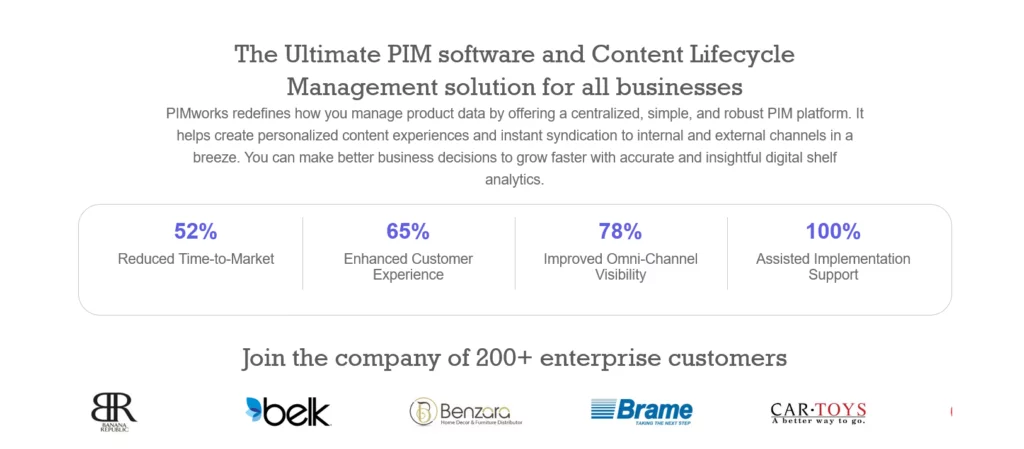
PIMworks stands out as a robust Product Information Management (PIM) software designed for efficient multichannel product syndication. It offers a comprehensive dashboard to track product details, variants, reviews, and sentiment scores.
Why Choose PIMworks: PIMworks serves as a centralized repository for managing product data and vendor information. This platform aids in optimizing product catalogs and organizing digital assets effectively. Notably, PIMworks excels in workflow management, facilitating collaborative efforts among teams involved in catalog creation. Its AI and ML capabilities enable automatic product catalog enrichment sourced from top marketplaces, ensuring content optimization and SEO compliance for higher rankings and increased sales.
Standout Features & Integrations:
- Workflow Management: Grants distinct access roles, facilitates collaboration, and allows task tracking and assignment among various departments.
- AI and ML Enrichment: Automatic content extraction from leading websites ensures optimized content alignment with market standards.
- Integrations: Seamlessly integrates with Amazon, Shopify, Walmart, Houzz, Magento, among others.
Learn how to show product categories here.
3. 4ALLPORTAL: PIM + DAM Combo Solution
- Pricing: Upon request
- Visit Website: [Link]
- 15 reviews
- 30-day free trial + free demo available
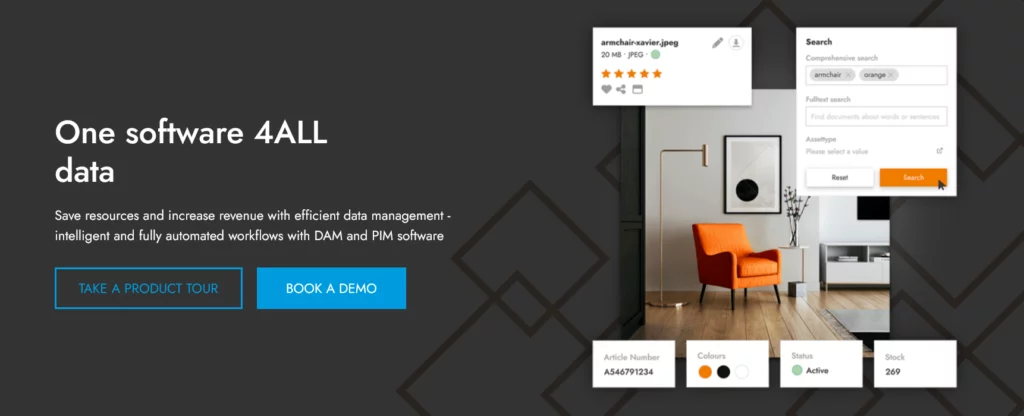
4ALLPORTAL offers a Digital Asset Management (DAM) and Product Information Management (PIM) system tailored for streamlined workflows around product data and file management.
Why Choose 4ALLPORTAL: Its PIM system serves as a centralized hub for sales and marketing-related product information. The system efficiently consolidates data from diverse third-party systems, ensuring optimal provisioning, management, compliance, and search functionalities. Scalability is a key highlight, supported by various connectors and modules, allowing for robust software customization.
Standout Features & Integrations:
- ERP Integration: Connects with enterprise resource management systems like NetSuite, SAP, Oracle, Microsoft, enabling seamless data population across platforms.
- Self-Service Marketing Materials: Provides direct access to download or print marketing materials, enhancing marketing efficiency.
Integrations: Adobe Creative Suite, Drupal, Azure AD, Dropbox, Jira, Magento, Slack, diverse social media platforms, and extensive integrations available through Zapier.
4. OneTimePIM: Streamlined Ecommerce PIM Solution
- Pricing: From $1,050/month (900 GBP)
- Visit Website: [Link]
- 13 reviews
- Free trial available
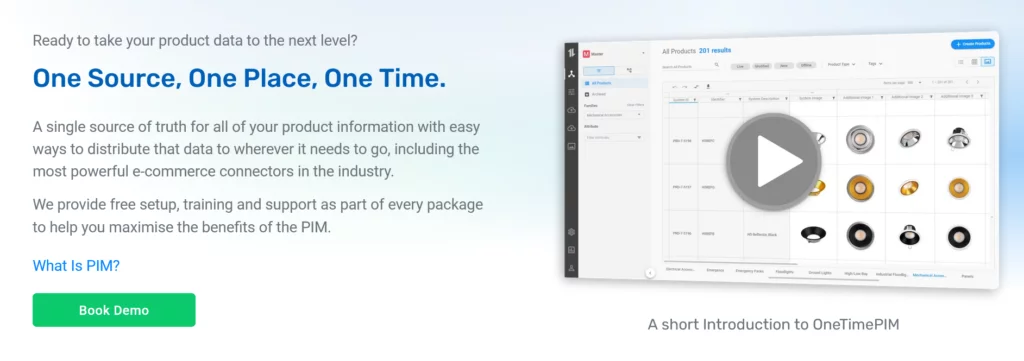
OneTimePIM stands out as a Software as a Service (SaaS) PIM solution that seamlessly integrates a digital asset management system and automatic datasheets feature. It serves as a unified platform for aggregating all product data.
Why Choose OneTimePIM: Unique among PIM companies, OneTimePIM offers complimentary onboarding services. This includes extensive support to set up the PIM, import and clean data, and configure integrations. The platform features custom-built e-commerce connectors directly within the PIM, providing complete visibility and reporting on transmitted product data to your website. By mapping PIM attributes to the e-commerce store and running updates or scheduling them, users can instantly update their websites. These connectors are specifically designed for purpose and are renowned as the best in the PIM industry. OneTimePIM seamlessly integrates with ERPs and offers a hassle-free data management experience.
Standout Features & Integrations:
- Custom Datasheet Creation Tool: Easily update product information and convert it into catalogs or pamphlets through a user-friendly drag-and-drop interface.
- Dynamic Datasheets: Updates in real-time based on product information spreadsheets, offering multiple templates and customization options.
- Integrations: Shopify, Magento, WooCommerce, and various ERP systems.
5. Akeneo PIM: Collaborative Data Management
- Pricing: From $25,000/year
- Visit Website: [Link]
- 152 reviews
- Free version available + 14-day free trial
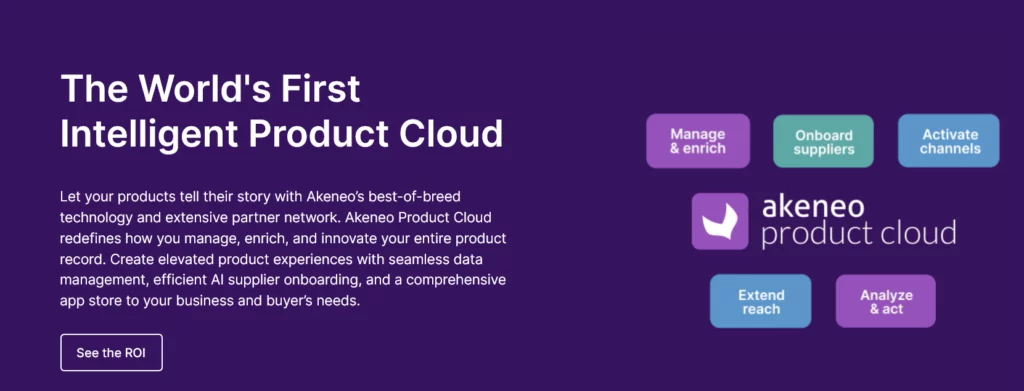
Akeneo serves as an omnichannel commerce solution catering to collaborative product teams seeking consistent and quality data management.
Why Choose Akeneo: Akeneo provides a unique blend of PIM and project management features, prioritizing both data accuracy and teamwork. Its intuitive UI enables seamless navigation between product information, Digital Asset Management (DAM), and task management. The platform offers progress tracking dashboards for effective work-in-progress visibility. However, Akeneo’s capabilities are somewhat limited in handling product substitutions, cross-referencing, and upselling opportunities. Additionally, its product variant modeling might pose challenges in importing and exporting base product templates.
Standout Features & Integrations:
- Teamwork Assistant: Empowers project management with task distribution, completion tracking, and data on project status.
- Multi-User PIM: Advanced permissions, user-specific access, and role definitions ensure secure and tailored workspaces.
- Integrations: Seamless integration with 100+ platforms including Adobe Magento, Salesforce Commerce Cloud, Google Shopping, Spryker, and ShopifyPlus, among others, using REST and Events APIs.
6. Syndigo: Ecommerce Analytics Specialist
- Pricing: Available upon request
- Visit Website: [Link]
- 66 reviews
- Free Demo
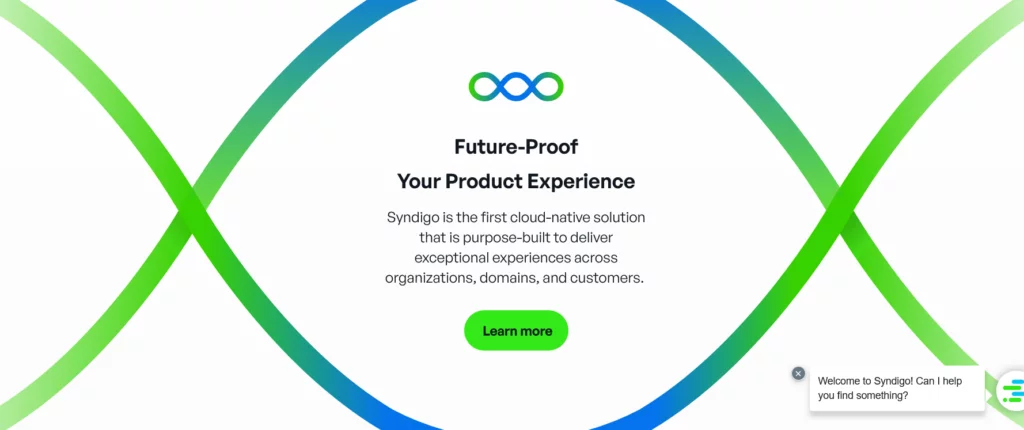
Syndigo stands as a content experience hub, aligning manufacturers, suppliers, distributors, and retailers for optimized PIM solutions.
Why Choose Syndigo: With over 250K available product attributes, Syndigo excels in providing detailed product differentiation. It parses data to offer optimization feedback and alerts for product status enhancement. The platform monitors product content, providing improvement alerts, actionable customer insights, essential product KPIs, and vendor health scores. However, its pay-per-SKU service subscription model might be limiting for larger product databases. Managing bulk edits for extensive data can also be cumbersome, requiring a workaround using Excel files for batch changes.
Standout Features & Integrations:
- Master Data Management: Offers detailed analytics, internal data governance, and effective content delivery.
- Integrations: Partners with 1,500+ global retailers including Walmart, Costco, FreshDirect, Amazon, and Instacart.
7. Pimcore: Versatile Open Source PIM
- Pricing: Available upon request
- Visit Website: [Link]
- 44 reviews
- 3-months reduced cost trial
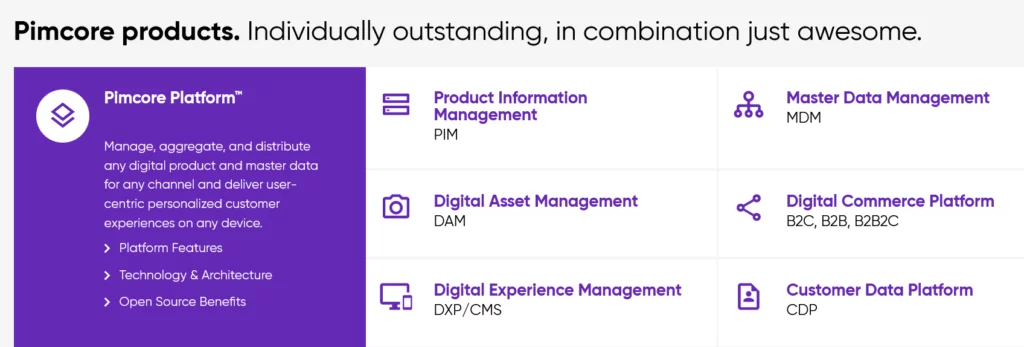
Pimcore serves as a robust data and experience management platform with open-source PIM options.
Why Choose Pimcore: The community edition is free, offering an open-source GPLv3 software license with publicly accessible source code. The platform supports PIM/MDM/CDP/DAM, DXP/CMS/commerce, and allows unlimited entities, data, and users. However, the DAM asset portal extension lacks compatibility with mobile devices. It also lacks real-time tracking of product data edits, which might result in inadvertent concurrent changes.
Standout Features & Integrations:
- Enterprise-Grade Translation System: Offers multi-language support for product content customization.
- Integrations: Connects with 1600 pre-integrated marketing, shopping, retail, and business channels, facilitating seamless connectivity with Microsoft Excel through CSV and XLSX spreadsheet import/export, and offers APIs for additional connections.
8. inRiver: Reseller-Centric PIM
- Pricing: Available upon request
- Visit Website: [Link]
- 100 reviews
- Free demo
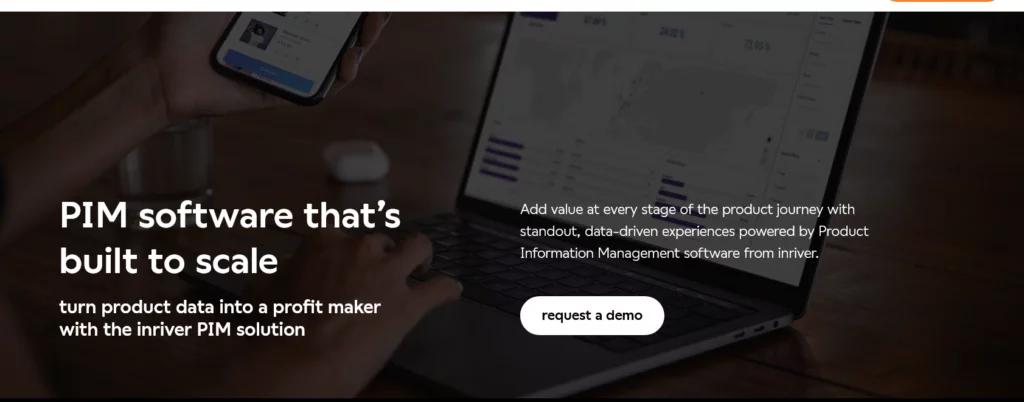
inRiver is a digital-first PIM solution tailored for driving revenue and supporting various content types.
Why Choose inRiver: It leverages smart image recognition technology for auto-populating attributes and offers a self-service portal for resellers’ controlled access to data. However, it lacks native DAM organizational functions and requires additional investment and time for asset management integration.
Standout Features & Integrations:
- Digital Shelf Analytics (DSA): Monitors product performance, syndication strategy, and evaluates product stories’ impact.
- Integrations: Partners with 1WorldSync, Adobe, Amla Commerce, Apptus, Aprimo, Blosm, and various other platforms for diverse integration opportunities.
9. Productsup: Drag-and-Drop Publisher Templates
- Pricing: Available upon request
- Visit Website: [Link]
- 6 reviews
- Free demo
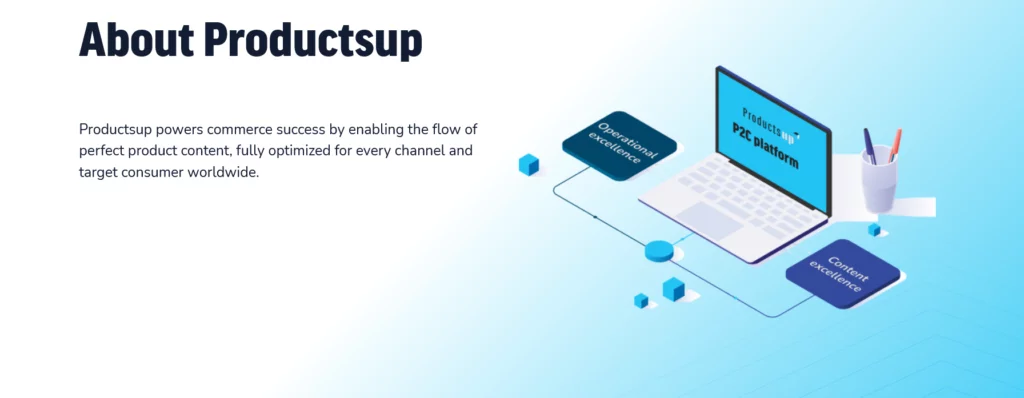
Productsup is a P2C platform and product content syndication software supporting various data sources.
Why Choose Productsup: Users can import and export data across multiple sources, platforms, and shop systems regardless of data format or size. It offers templates for popular publishers like Google, Facebook, Shopify, and Amazon, streamlining the feed building process. However, its knowledge base is still evolving, offering room for improvement in documentation.
Standout Features & Integrations:
- Modular Suite: Tailors functionality with modules for product onboarding, advertising management, marketplaces, performance insights, and retailer relationship management.
- Integrations: Provides over 2000 built-in export integrations, including connections with Google Shopping, Amazon Marketplace, Facebook Dynamic Ads, and more.
Factors to Consider Before Choosing PIM:
- Business Needs: Assess your specific requirements such as data volume, product complexity, user collaboration, and integration capabilities.
- Scalability: Ensure the chosen PIM solution can scale as your business grows, accommodating increased product lines or data volumes.
- Data Quality and Governance: Look for features supporting data governance, quality checks, and maintenance to ensure accuracy and consistency.
- Integration Capabilities: Verify compatibility with existing systems like eCommerce platforms, ERPs, or CRMs for seamless data exchange.
- User Interface and Usability: Opt for a user-friendly interface to streamline data input, editing, and retrieval for users across your organization.
- Customization and Flexibility: Assess the platform’s customization capabilities to adapt to unique business processes and requirements.
- Security and Access Control: Prioritize a PIM system with robust security measures to safeguard sensitive product information and control user access.
- Vendor Support and Updates: Research the vendor’s track record for customer support, system updates, and ongoing improvements.
Conclusion:
Selecting the right Product Information Management (PIM) system is a critical step in ensuring efficient data handling and streamlined operations. By carefully evaluating factors such as scalability, data quality, integration capabilities, and user-friendliness, businesses can make informed choices that align with their specific needs. A well-chosen PIM solution not only centralizes product data but also boosts accuracy, enhances productivity, and supports effective decision-making across multiple channels.
FAQs on PIM:
How does PIM differ from other data management systems like ERPs?
While ERPs handle broader organizational data, PIM systems specialize in managing specific product information for marketing, sales, and distribution across multiple channels.
What challenges can a PIM system address in an organization?
PIM systems can resolve issues related to inconsistent product information, data silos, manual data entry errors, and difficulties in maintaining product data across multiple channels.
Is it necessary to invest in a PIM system for a small business?
While small businesses may initially manage product data manually, as they grow or expand channels, a PIM system becomes beneficial for maintaining accurate and consistent product information.



